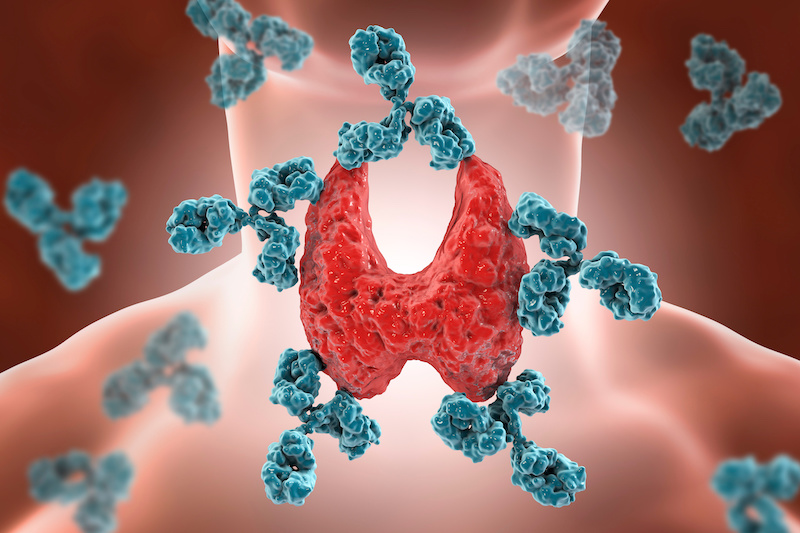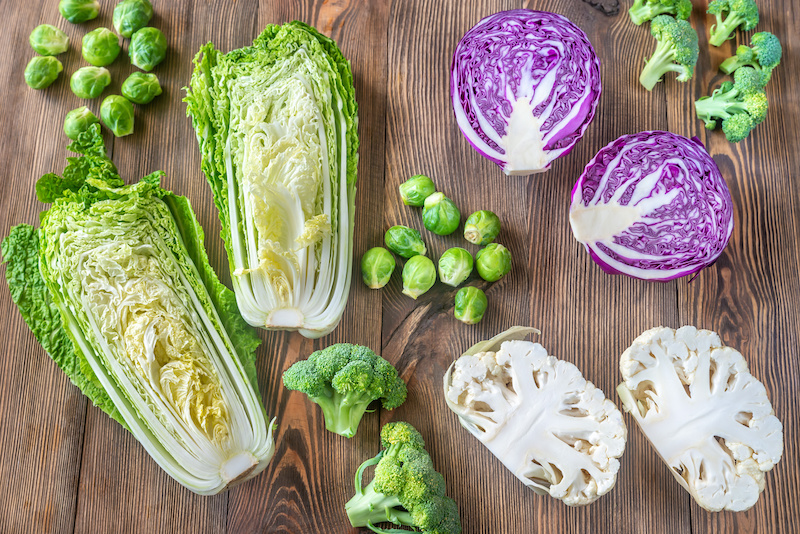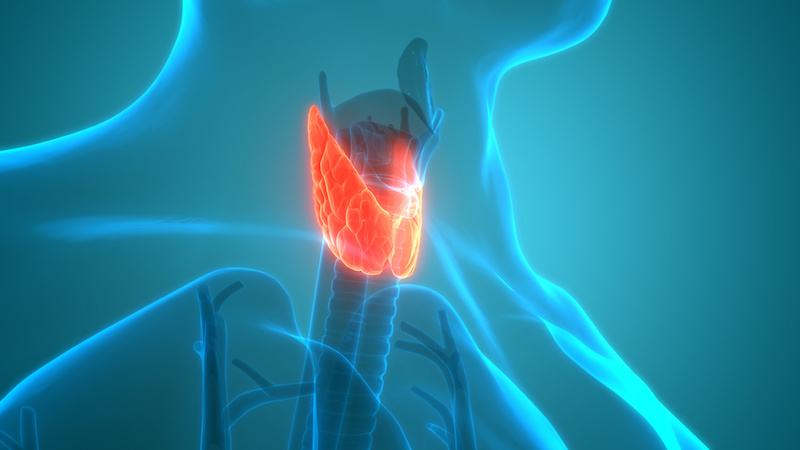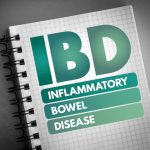What is Hypothyroidism?
The thyroid is a small, butterfly-shaped gland that sits at the front of the neck, under the voice box. The thyroid plays a vital role in many important body functions, including metabolism, growth, and development, and even bone density. It does this by producing important hormones known as thyroid hormones, which it releases in response to signals from the brain, in order to speed up or slow down processes such as metabolism, to help keep the body in balance. Hypothyroidism is a condition whereby the thyroid is underactive and isn’t producing enough thyroid hormones to maintain health. There are two main categories of hypothyroidism that can be seen in a naturopathic clinic:
- Overt Hypothyroidism
Overt hypothyroidism, often due to the autoimmune condition Hashimoto’s thyroiditis. Overt hypothyroidism is readily diagnosed via blood tests.
2. Subclinical Hypothyroidism
This is another common presentation, especially for naturopaths. Your blood test results may be within “normal” ranges (but not necessarily within the optimal ranges that a naturopath looks at), but you still have functional signs and symptoms that indicate your thyroid gland is not working as it should be.
The Thyroid Hormones
There are 5 important hormones associated with normal thyroid function. These hormones work in a feedback loop – low levels of one hormone will trigger a response in the body to upregulate its production, and vice versa.
TSH – Thyroid Stimulating Hormone
This hormone is produced in the hypothalamus, a part of the brain. TSH is secreted by the brain when it detects low levels of thyroid hormones, sending a signal to the thyroid that it needs to increase production.
T4 – Thyroxine
T4 is the precursor to active thyroid hormone. It is made by the thyroid using nutrients such as the mineral iodine and the amino acid tyrosine.
T3 – Triiodothyronine
T3 is the active form of thyroid hormone. T4 is converted into T3 by enzymes that rely on nutrients such as zinc and selenium in order to function properly. Some of the important functions of T3 include:
- Rate of metabolism and oxygen use in the body
- Cardiac function and resting heart rate
- Sympathetic nervous system regulation (“fight or flight” mode)
- Bone mineral density
- Muscle, bone, and brain development in children
rT3 – reverse T3
This is a type of inactive T3 hormone that is sometimes mistakenly produced by the body when cortisol levels are too high (such as during periods of stress). See below for more information on rT3.
Symptoms of Low Thyroid Hormones
Due to the broad effects that thyroid hormones have in the body, common symptoms are many and varied and can include:
- Fatigue, brain fog, mental slowness, poor memory
- Weight gain
- Cool, dry skin, sensitive to cold temperature
- Hair loss, including eyebrows and body hair
- Constipation, gastrointestinal dysfunction, food intolerances
- Depression, low libido
- Puffiness around the face
- A “hoarse” sounding voice
- Carpal tunnel syndrome, joint and muscle pain, muscle cramps and weakness
- Menstrual irregularities, infertility, miscarriages
- High cholesterol
- Blood sugar imbalances and insulin resistance

Types and Causes of Hypothyroidism
There are a number of different causes of hypothyroidism. In Australia, most hypothyroidism is due to the autoimmune disease Hashimoto’s thyroiditis, however there are other causes, too.
- Hashimoto’s Thyroiditis: the most common cause of hypothyroidism in Australia. This is an autoimmune condition where the immune system mistakenly creates antibodies to attack the thyroid cells, causing irreparable damage to the thyroid and significantly reducing its function. People with Hashimoto’s thyroiditis may have little or even no remaining thyroid function and must take synthetic thyroid hormones. It is one of the most common autoimmune conditions, affecting around 1 in 33 Australians.
- Iodine deficiency: Iodine is a crucial nutrient for making thyroid hormone. Iodine deficiency as a cause of hypothyroidism in Western countries like Australia was previously considered to be a rare issue, but it is becoming a growing concern again, with new studies showing a rise in mild-moderate iodine deficiency, particularly in children and pregnant women. This is a real concern, as iodine is vital for not only thyroid hormones, but also for cognitive development in children.
- Transient hypothyroidism: This is a type of hypothyroidism that can occur in postpartum women, due to a condition known as postpartum thyroiditis. In postpartum thyroiditis, immune cells attack the thyroid gland, causing inflammation. This causes a temporary rise in thyroid hormone production (hyperthyroidism), followed by a period of low thyroid function (hypothyroidism). It’s not fully understood why this issue occurs, but it is more common in those with a history of autoimmune disease such as type 1 diabetes. 75-85% of patients regain normal thyroid function, but for some, low thyroid function persists long term.
Diagnosis of Hypothyroid
Diagnosis of hypothyroidism is through a blood test called a thyroid panel. A thyroid panel assesses the blood levels of several different thyroid hormones, including:
- TSH: In hypothyroidism, this hormone will be high. Often a routine test through your GP will only assess for TSH first, before assessing for other hormones.
- Free T4
- T3: because T3 is the active form of thyroid hormone, it is low levels of T3 that will cause symptoms of hypothyroidism.
- Reverse T3 – rT3 is an inactive form of T3. RT3 is not usually a part of a standard thyroid panel but can be tested for separately if indicated.
General practitioners will commonly prescribe L-thyroxine medication where indicated, which can be taken in conjunction with dietary and lifestyle changes.
Naturopathic interpretation of thyroid blood tests is slightly different to the standard medical approach. This is because a naturopath is looking to see whether or not you fit within the optimal range for thyroid function, rather than fitting within the broader “normal” range. Looking at the optimal range means subclinical and mild hypothyroidism is more likely to be identified and treatment strategies used to help intervene earlier, before more serious disease develops. Naturopaths also look at a marker called “reverse T3” (rT3). This is a non-active form of T3. Your body might start producing more rT3 instead of T3 if cortisol levels are too high, such as due to chronic stress. Reverse T3 still binds to thyroid receptors in the body and still sends feedback to the brain that there is plenty of thyroid hormone circulating, but it doesn’t cause a response the way T3 does. If your TSH levels are normal but you have symptoms of hypothyroidism, it is possible you may have high rT3.

Naturopathic Understanding of Thyroid Function
Hypothyroidism and Gut Health
Healthy digestive function is important in the production of active thyroid hormone. Low thyroid hormone levels means gastrointestinal function slows down. This can lead to:
- Slow transit time and constipation
- SIBO and changes to the microbiome
- Inflammation and “leaky gut”
Thyroid and Liver
Thyroid hormones can impact normal liver function, leading to abnormalities in certain liver enzyme levels. Both subclinical and overt hypothyroidism places you at higher risk of non-alcoholic fatty liver disease. This is why a naturopath will also look at your overall liver health and may include treatments to help support your liver if necessary.
Thyroid Function and Chronic Stress
when you experience high levels of stress, the body inhibits the production of active thyroid hormone and symptoms can worsen. Stress management can play a big part in helping to relieve some of the symptoms of hypothyroidism.
Naturopathic Treatment Strategies for Hypothyroidism
Dietary Strategies
Reduce Your Intake of Goitrogenic Foods
Certain foods are classified as being “goitrogenic” foods. These are foods that inhibit the production of thyroid hormone in the body. Vegetables from the Brassica family are particularly goitrogenic. This includes broccoli, cauliflower, Brussels sprouts, kale, and cabbage. Soy and turnips also act as goitrogens. The thyroid-inhibiting effect of these foods is most profound when they are consumed raw. Limit your consumption and when you do eat them, always cook them first.
Reduce or Eliminate Gluten
Gluten causes inflammation in the gastrointestinal tract and alters immune response in some people, reducing thyroid function. Gluten-containing foods include wheat, flour, rye, oats, and barley. Replace these grains with buckwheat, millet, quinoa, or rice.
Identify and Eliminate Food Intolerances
Intolerances to foods such as gluten, dairy, soy, corn, and more may contribute to hypothyroidism, because of the damage they cause to the gut lining. This gut damage can lead to “leaky gut”, which as discussed above, is closely linked to hypothyroidism. If food intolerances are suspected, a diet diary may be prescribed.
Reduce Excess Caffeine and Alcohol
Both caffeine and alcohol compromise liver and gastrointestinal function and production of active thyroid hormone. Reduce your intake or eliminate entirely. If you do wish to consume caffeine, stick to one or two cups per day and consume before 2pm. If you do wish to consume alcohol, choose wheat-free alcohols such as wine. Red wine can be a good option as it is rich in antioxidants. Stick to no more than one standard drink per day.
Reduce Intake of Processed, Sugary Foods
Processed, sugary foods compromise liver and gastrointestinal function and reduce production of active thyroid hormone. Reducing your intake of these foods can make a big impact! Processed and sugary foods to watch out for include:
- Pastries, cakes, cupcakes, cookies and other sugary baked foods
- Sweets, lollies, chocolate, biscuits
- Chips and processed snack foods
- Sugary yoghurts, ice creams, and other sweet dairy foods
- Soft drinks and other sugar-sweetened beverages
Eat Plenty of organically-grown fruit and vegetables
Fruits and vegetables contain high amounts of vitamins, minerals, antioxidants and polyphenols that can help to reduce inflammation in the thyroid and gut. Fibre can also help to heal gut damage by feeding your beneficial gut bacteria. Follow the below guide for boosting your intake and choosing a wide variety of fruits and vegetables:
- One serve of vegetables = ½ cup cooked or 1 cup raw.
- One serve of fruit = one cup chopped or one whole piece.
- Choose fruits and vegetables in a variety of colours each day to maximise the different types of micronutrients and antioxidants you are consuming – many of the antioxidants in fruits and vegetables are what gives the food its pigment.
- Red fruits and vegetables – contain compounds such as lycopene and anthocyanins
- Tomatoes, capsicum, strawberries, cherries, beetroot, radish, chillies, radicchio, rhubarb, raspberries, cranberries
- Orange fruits and vegetables contain compounds such as beta-carotene
- Oranges, capsicum, pumpkin, apricots, carrots, papaya, persimmons, mangoes, sweet potatoes
- Yellow and light green fruits and vegetables contain compounds such as carotenoids
- Capsicum, kiwi fruit, corn, pineapple, lemons, cabbage, celery, limes, pears, avocado, fennel, onion
- Dark green fruits and vegetables contain compounds such as lutein and zeaxanthin
- Broccoli, Brussels sprouts, kale, bok choy, spinach, silver beet, asparagus, green beans, peas, leeks, artichokes
- Purple fruits and vegetables contain compounds such as anthocyanins and phenols
- Cabbage, grapes, eggplant, onions, plums, blueberries, blackberries
- Prioritise non-starchy vegetables (i.e. choose tomato or capsicum over potato, sweet potato, or other root vegetables).
- Eat plenty of leafy greens, like spinach, bok choy, silver beet, and dark green lettuce varieties
- Remember to cook goitrogenic vegetables such as broccoli, kale and cauliflower before consuming.

Eat Plenty of Zinc-Rich Foods
Zinc is a powerhouse nutrient that is vital for healthy thyroid hormone production and balance. Many of us are low in zinc, and zinc deficiency can be a particular issue for anyone on a plant-based diet. Foods that are rich in Zinc include seafood (especially oysters), chicken, beef, liver, oatmeal, nuts (pine nuts, pecans), seeds (pumpkin, sunflower, flax, chia), and spinach.
Eat Plenty of Iodine-Rich Foods
Iodine is essential for thyroid hormone production, but low iodine intake is a problem in Australia, because our soils are low in this mineral. Foods that are higher in iodine include seafood, sea vegetables (nori, kelp, kombu), citrus fruits, and egg yolks. Vegans and vegetarians may need to consider supplementation.
Eat Plenty of Selenium-Rich Foods
Selenium is an important antioxidant and is needed for thyroid hormone production. Brazil nuts are naturally rich in selenium when grown in nutritious soil– just one Brazil nut can contain up to 100% of your daily selenium requirements!
Eat Plenty of Omega-3 rich foods
Omega-3 fatty acids are important for reducing inflammation. Foods rich in omega-3 fatty acids include fish, hemp seeds, walnuts, chia seeds, and flax seeds. This is another nutrient that vegans and vegetarians in particular may need to supplement. Vegan algal oil supplements are a great option.
Lifestyle Strategies
Stress Management
The effect of stress on thyroid function is complex, however altered adrenal function and cortisol levels negatively impact the production of thyroid hormones and it is important to reduce stress if possible. Try the following to help with stress management:
- Mindfulness meditation – even 10 minutes per day of mindfulness meditation can help reduce feelings of stress. Many meditation studios offer online classes, or you can use an app such as “insight timer” for access to thousands of guided meditations for free.
- Yoga or tai chi – as with meditation, these are both wonderful for helping to release stress. There are many apps available online, or you can try YouTube for free videos as well – “Yoga with Adrienne” is a popular YouTube channel with dozens of free videos to try.
- 7-9 hours of sleep each night: prioritising your rest is essential for healthy stress levels. Make your sleep a priority!
- Counselling or psychology – if you don’t already have a regular counsellor or psychologist, it is worthwhile pursuing this. Having someone you can speak to about stressors in your life can make a huge impact on both your physical and mental wellbeing.
Enjoy Daily Gentle to Moderate Exercise
Excess exercise at high intensity may negatively affect thyroid function and cortisol response, especially in early treatment. Choose gentle to moderate-level daily exercises that you enjoy. About 30 minutes per day is a great start. Types of exercise might include walking, hiking in nature, swimming, light aerobics, team sports, yoga, pilates, and more.
Herbal Medicines and Supplements
Herbal medicines can be a really useful tool, particularly for mild or subclinical hypothyroidism, and are often prescribed as part of your naturopathic treatment plan to support symptoms, immune and thyroid.
The right supplements for you will depend on the underlying cause of your hypothyroidism as each person is unique, but might include supplements to:
- Boost thyroid hormone production
- Improve immune function
- Help with stress support
- Help with liver function
- Support gastrointestinal function
As the naturopath and Founder of Performance in Health Wellbeing Clinic, I have Hashimoto’s and understand symptoms of low thyroid and this health condition very well from personal experience.
If you feel that a thorough naturopathic consultation might be useful for how you are feeling or your particular health condition, please reach out and email me on [email protected] or book an initial consultation via our contact page here.
References
BioMedica Nutraceuticals. (2018). Herbal and nutritional support for health thyroid function: A focus on subclinical hypothyroidism and autoimmune disease.
Chakera, A. J., Pearce, S. H. S., & Vaidya, B. (2012). Treatment for primary hypothyroidism: Current approaches and future possibilities. Drug Design, Development and Therapy, 6, 1–11.
Endocrine Society of Australia. (2019). Hypothyroidism. Hormones Australia. https://www.hormones-australia.org.au/endocrine-diseases/hypothyroidism/
He, W., An, X., Li, L., Shao, X., Li, Q., Yao, Q., & Zhang, J. (2017). Relationship between hypothyroidism and non-alcoholic fatty liver disease: A systematic review and meta-analysis. Frontiers in Endocrinology.
Hechtman, L. (2012). Clinical naturopathic medicine. Elsevier Australia.
Thomas, C. (2018). The naturopath’s guide to hypothyroidism. Herbal Extract Company.










